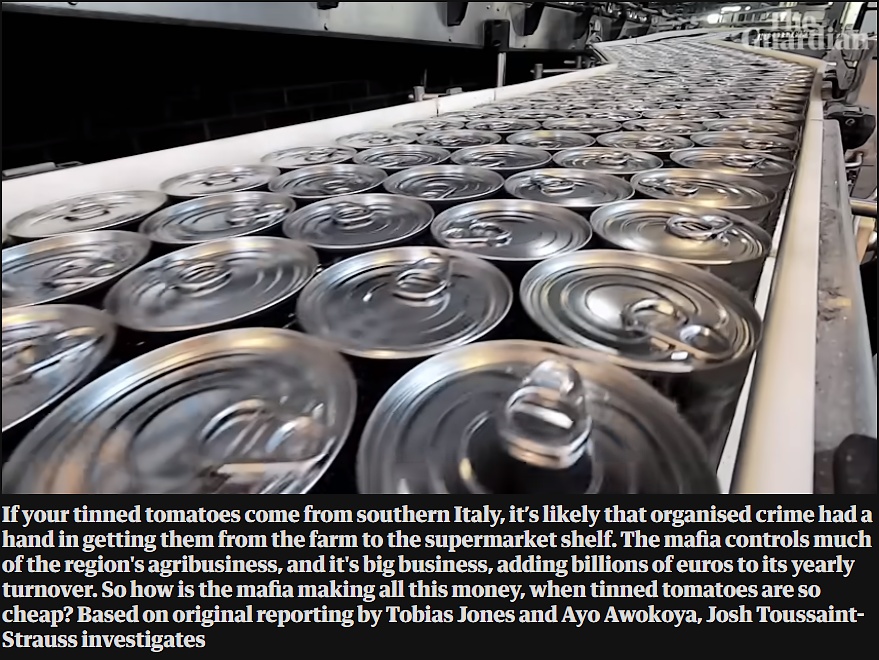Press release
, François-Xavier Branthôme
“These are extremely disparaging statements that directly link criminal organizations with the production of canned tomatoes.”
On September 14, the very respectable British newspaper The Guardian published a video entitled "How the Italian mafia makes millions from tinned tomatoes", in which journalists explain how, according to them, the Mafia of southern Italy controls agricultural production.
Many people and Tomato News’ readers saw this film from The Guardian on some alleged fraudulent activity which may take place in southern Italy. ANICAV immediately reacted to deny these allegations in an official press release which we publish in full below.

“Napoli, 19 settembre 2023
Dear Mr. Toussaint-Strauss,
We take note, with disappointment, of the report published on your website online edition on September 14 entitled "How the Italian mafia makes millions from tinned tomatoes."
As ANICAV - the national association representing private Italian tomato processing companies – we have the duty and responsibility to clarify some points in order to protect the reputation and dignity of the Italian canning industry, which, although not directly mentioned in the video in question, is seriously damaged by it, since, as the direct interface with the final consumer, it sees its own products implicated.
In fact, the introduction to the video states that "If your tinned tomatoes come from Southern Italy, it’s likely that organised crime had a hand in getting them from the farm to the supermarket shelf. The mafia controls much of the region's agribusiness, and it's big business, adding billions of euros to its yearly turnover."
These are extremely disparaging statements that directly link criminal organizations with the production of canned tomatoes. The issues raised in the video must be addressed responsibly, without generalizations that tend to amplify the extent of the phenomenon by feeding a culture of suspicion that is irreversibly harmful to an entire industry and consumers.
To protect producers and for the sake of correct consumer information, we believe it is essential to clarify some fundamental issues, which we ask you to publish as a correction to the information in the video.
- The processing tomato sector is only marginally touched by the phenomenon of caporalato because it is characterized by a low labour impact since the tomato harvest for the processing industry is almost entirely carried out mechanically.
- For years, the supply chain has been carrying out actions to counteract the phenomenon of caporalato, which must be fought even in the case of a single worker employed informally, acting in particular to foster a new corporate culture of social responsibility, including paths leading to the ethical certification of agricultural and industrial companies. To this end, the association has worked and continues to work on two fronts: raising the awareness of all parties involved in the phenomenon, through the sharing of the problem among the different representative bodies, and consultation with national and regional institutions.
Thanks to the awareness-raising actions put in place by ANICAV and the application of the law on caporalato, which has led to an increasingly incisive controls and a tightening of penalties by the authorities in charge, the phenomenon, even looking at the data of the latest processing campaigns, is shrinking.
- Regarding the problem of transportation and housing for workers, which remain among the most critical issues, we have been engaged jointly with the Italian Ministries of the Interior and Agriculture, as partners in the project "Fi.Le. - Filiera Legale" financed under the National Operational Programme on Legality. This project, in the territory of the province of Foggia, aimed to promote legal practices in the processing tomato sector through the creation of a platform providing law enforcement agencies with information for the control of legality and to ensure that operators in the supply chain can manage electronically the supply of labour and their transportation services to and from the fields.
- On the issue of prices, as highlighted in the report, in many cases it is precisely the Large-scale Retailers who exert an ever-increasing pressure on their suppliers by demanding ever greater discounts and price reductions, creating significant difficulties for the industries. But this does mean there is an automatic process whereby the industry reverses its losses on farmers and consequently "forces" them to resort to forms of informal labour and wages below the minimum level, indeed, on the contrary, the "rules of engagement" of our supply chain are such that the price for the raw material paid in Italy to farmers is the highest in the world, particularly in the Central-South basin.
Consequently, it is absolutely clear that the processing industry is doing everything in its power to find solutions to the problem of caporalato despite the fact that this is primarily an issue for the agricultural producers.
Of course, we must and will continue to maintain a high level of attention without, however, creating false and unjustified alarmism.
Therefore, we believe it is your duty to give adequate space to our arguments in order to provide accurate and complete information to protect the industry and consumers.
We remain at your disposal for any further information.
Yours sincerely
ANICAV
Il Presidente Marco Serafini”
Some complementary data:
* The Guardian’s video is available here.
* ANICAV's letter to The Guardian is attached below































